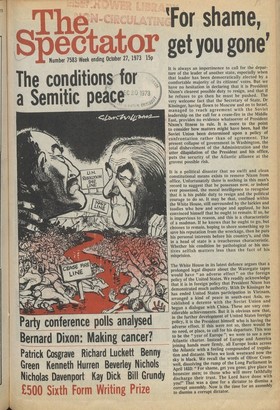'For shame, get you gone'
It is always an impertinence to call for the departure of the leader of another state, especially when that leader has been democratically .elected by a comfortable majority of its citizens' votes. But we have no hesitation in declaring that it is President Nixon's clearest possible duty to resign, and that if he refuses to go then he must be pushed. The very welcome fact that the Secretary of State, Dr Kissinger, having flown to Moscow and on to Israel, managed to reach agreement with the Soviet leadership on the call for a cease-fire in the Middle East, provides no evidence whatsoever of President Nixon's fitness to rule. It is more to the point to consider how matters might have been, had the Soviet Union been determined upon a policy of confrontation rather than of agreement. The present collapse of governmerit in Washington, the total dishevelment of the Administration and the utter dilapidation of the President and his office, puts the security of the Atlantic alliance at the gravest possible risk.
It is a political disaster that no swift and clean constitutional means exists to remove Nixon from office. Unfortunately there is nothing in this man's record to suggest that he possesses now, or indeed ever possessed, the moral intelligence to recognise that it is his public duty to resign and the political courage to do so. It may be that, confined within the White House, still surrounded by the laekies and toadies who bow and scrape and applaud, he has convinced himself that he ought to remain. If so, he is impervious to reason, and this is a characteristic of a madman. If he knows that he ought to go, but chooses to remain, hoping to shore something up to save his reputation from the wreckage, then he puts his personal interests before his country's, and this in a head of state is a treacherous characteristic. Whether his condition be pathological or his motives selfish matters less than the fact of his misprision.
The White House in its latest defence argues that a prolonged legal dispute about the Watergate tapes would have "an adverse effect" on the foreign policy of the United States. We readily acknowledge that it is in foreign'policy that President Nixon has demonstrated much authority. With Dr Kissinger he has ended United States participation in Vietnam, arranged a kind of peace in south-east Asia, established a detente with the Soviet Union and begun a dialogue with China. These are very considerable achievements. But it is obvious now that, in the further development of United States foreign policy, it is the President himself who is having the adverse effect. If this were not so, there would be no need, or place, to call for his departure. This was to be the "year of Europe "; we were to see a new Atlantic charter. Instead of Europe and America joining hands more firmly, all Europe looks across the Atlantic with a feeling compounded of trepidation and distaste. When we look westward now the sky Is black. We recall the words of Oliver Cromwell, dissolving the rump of the Long Parliament in April 1653: "For shame, get you gone; give place to honester men; to those who will more faithfully discharge their trust. The Lord have done with you!" That was a time for a dictator to dismiss a corrupt assembly. Now is the time for an assembly to dismiss a corrupt dictator.


































